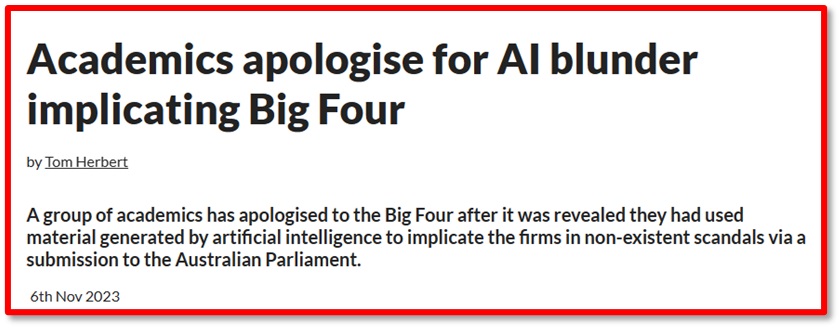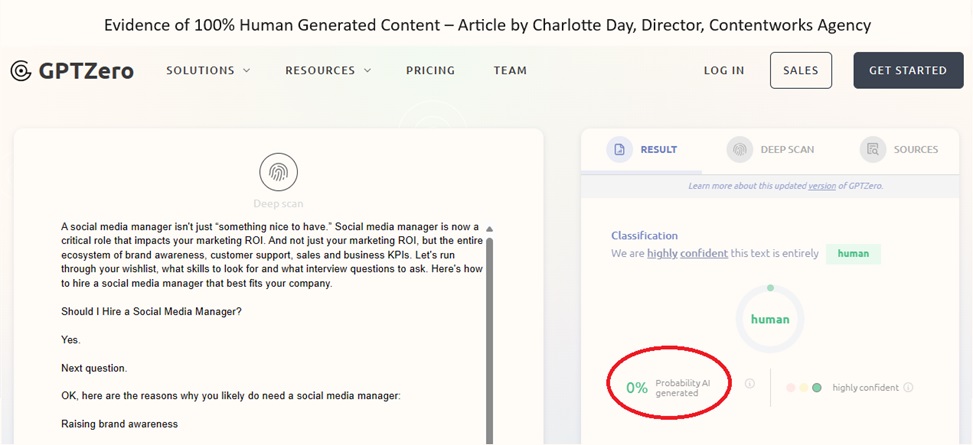The following is a guest editorial courtesy of Charlotte Day, Creative Director at Contentworks Agency.
Google has announced plans to crack down on AI-generated content designed to elevate search rankings by manipulating algorithms. It intends to delist AI-generated content from its search results, and even target individuals who publish low-quality content on websites with a high reputation score. The search giant explained that it would update algorithms in its core ranking systems to target 3 types of “content abuse,” with AI-generated, automated content topping the list.
So, we can expect updates that help Google better recognise web pages that offer poor user experiences, are unhelpful, or appear to be created more for SEO purposes than for people. Google estimates that these updates will help reduce unoriginal search results and spam by 40%. The updates will also improve the identification of expired domains that are being repurposed as “clickbait sites.” The updates to Google’s algorithms, expected to be rolled out by May 2024, will have a significant impact on improving the quality of online content and directing traffic to valuable and reputable websites. So how does Google identify AI content and more importantly, why should your finance brand care? Contentworks Agency is the leading content and communication agency for the financial services sector. Here’s what’s happening.
Why is Google Cracking Down on AI Content?
ChatGPT saw one million users within a month of being launched, mostly because companies saw generative AI as a quick and cheap way to create content, compared to hiring human writers. After all, ChatGPT and the many others launched since then, have free versions. As a result, generative AI has seen a massive surge in its use for SEO purposes. 76% of marketers are using AI to create basic content and there are also AI tools that can optimise content for search engines, including inserting the most relevant keywords.
So, why is Google cracking down on AI-generated content?
Accuracy of Information
Advancements in NLP (natural language processing) are helping AI generate blog posts, articles, and social media content that closely approximates human writing. This has led to concerns regarding the credibility and authenticity of online information. The proliferation of deepfakes has only deepened such concerns, with AI being able to convincingly manipulate voices and faces, making it difficult to tell fake content from real. Deepfakes are already being used for phishing, but they have the potential for greater damage, especially if used to spread false information. Statistics show that 86% of people worldwide have been exposed to fake news.
AI generated Fake news and misinformation are especially harmful to the financial sector. Not only in terms of trust, but also in terms of regulatory compliance.
Manipulation of Search Engines
Although Google has been working on determining the relevance and authority of webpages to assign rankings on its SERPs, AI-generated content might at times slip through the cracks. If AI is used to manipulate search rankings, users could not just be directed to low-quality sites but also to cybercriminals. This means authentic businesses will lose out unless they jump over to AI. Even then, there’s no certainty that high quality will win over technology-driven manipulation of SEO.
Self-Serving/Unethical Use
In November 2023, a group of Australian academics admitted to having used AI to make false allegations against the “Big Four” consultancy firms regarding serious wrongdoing, urging the Australian parliament to initiate an inquiry into the professional accountability and ethics of the consultancy industry.

Copyright Infringement
In December 2023, The New York Times filed a lawsuit against Microsoft and OpenAI, claiming that their AI systems were engaged in “widescale copying.” AI systems are often trained on copyright material without the permission of the rights owner. In addition, generative AI searches for information online to use in content creation, which can lead to copyright infringement. These are major concerns not just for SEO but also reputation. Google can go so far as to blacklist websites identified as using duplicate content.
How Google Identifies AI-Generated Content
Google analyses a variety of elements to distinguish between AI-generated and human-written content.
- Language quality: Google could check for semantic coherence, syntax, and language patterns. Illogical flow and inconsistencies could be red flags for AI content.
- Context and source: Relevant information and references to credible sources could indicate human-written content. AI is known to struggle with nuanced language, context-specific information, and cultural references.
- Emotion: AI-generated content tends to lack personality, while human content can be differentiated by personal touches and unique insights.
- Boring: Dare we say AI content is boring? As content professionals we can spot an AI written web page quickly and we think other savvy readers can too, which reflects in high bounce rates and low CTR. Of course, advancements happen every day but that’s where the landscape lies right now.
- Repetition: Since AI relies on templates and pre-programmed patterns, it tends to use formulaic or repetitive language.
- Metadata: Google already checks web pages for their coding structures and metadata to identify automated content.
How Will Google’s AI Update Impact Your Content?
You now have 2 months to conduct a content audit before Google rolls out its update. If your content either fails to meet its E-E-A-T (Experience, Expertise, Authoritativeness, and Trustworthiness) criteria or is flagged as being generated by AI, you could face several consequences.
- Downgrading on Search Rankings: Since the primary goal of the search giant is to rank the highest-quality, most relevant content first, lower quality and automated content will get down-ranked. This will make it difficult to discover your brand online since the top-ranking search result generates a CTR of 39.8% as of 2023, while the second and third ranks generate CTR of 18.7% and 10.2%, respectively. What’s even worse is that just 0.63% (less than 1% of searchers!) click on results on the second page of search results.
- Penalties: Not only will Google down-rank your content, but it might also flag it as spam. Google is coming down hard on low-quality, unoriginal content. So, the consequences could be even worse. Your content might be completely removed from the search results.
- Impact on Ads: If content fails to meet Google’s guidelines, your Ad score and overall performance could also be adversely impacted.
So, What Should Finance Brands Do With Their Content?
✔ Aside from Google’s penalties, finance brands also need to focus on regulatory guidelines. Despite the rapid evolution of AI, including NLP and Large Language Models (LLMs), it still cannot ensure compliance with the diverse regulations across jurisdictions. Finance brands need to pay close attention to their content and images to ensure they are compliant.
✔ As AI evolves, Google will continue to refine its search algorithms to prioritise user experience and human content. So, monitoring Google’s updates and incorporating SEO best practices will be key to ensuring the highest search rankings.
✔ In addition to relevance, Google prioritises recent content to deliver search results. This makes it crucial to update your content regularly. A content gap analysis could prove immensely useful in supplementing your content with missing information or deeper insights. Update your site map to ensure it includes all the updated content. Contentworks Agency works with brokers to regularly add fresh and engaging content to their blogs, landing pages, social media pages, eBooks and whitepapers.
✔ Conducting a site audit is a great way to gain insights into the improvements required to ace the SEO game. It will reveal broken links or images, redirects, loading speed issues, content quality, HTML tags, and more. While there are online tools to conduct such audits, the most effective course of action is to use the services of an experienced marketing team with expertise in the finance domain.


Contentworks Agency is the preferred content partner for leading brokers, fintechs, banks, and financial services providers worldwide. The team is experienced in strategising and creating a wide range of content verticals for the finance sector. We utilise anti-AI checkers, like GPTZero pictured above, to ensure that our content is human written and therefore SEO friendly.
Book a free Zoom call with our team to arrange a site audit, human rewrite and Google friendly content.









